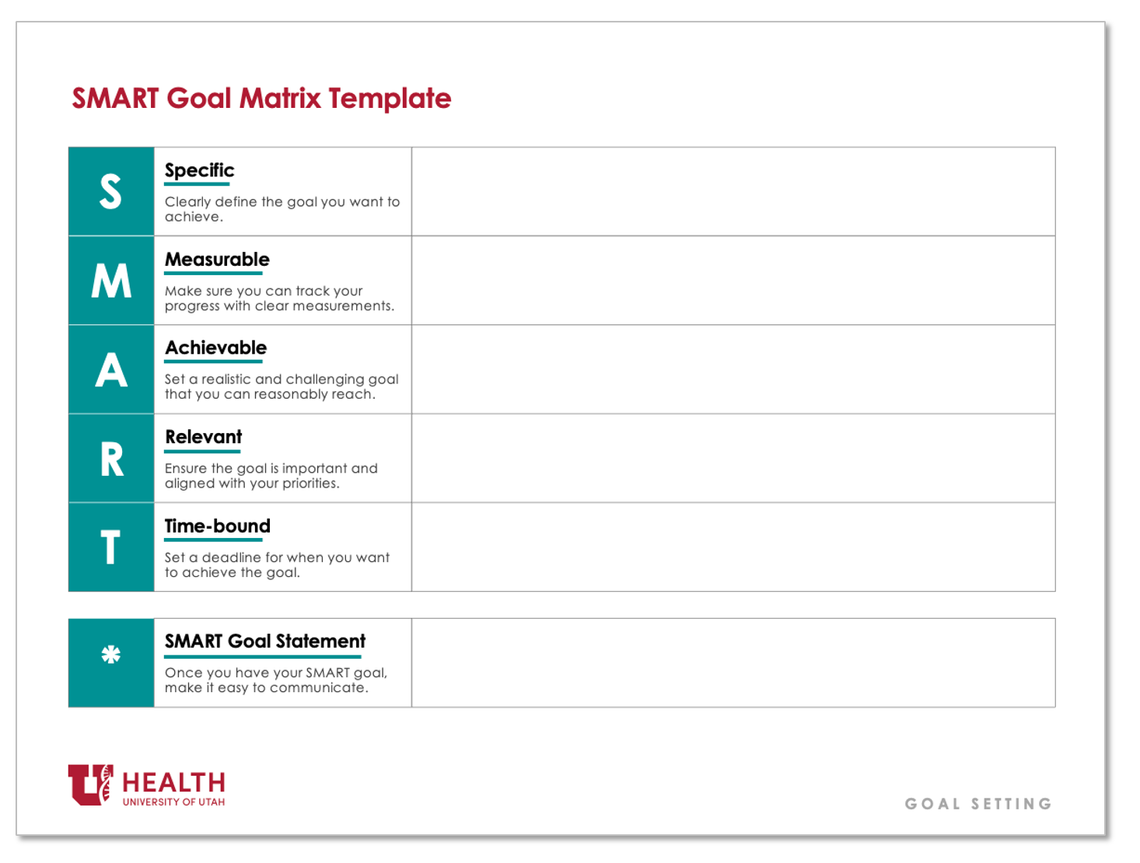Before setting any goal, ask "Why"?
Before goal setting, having a clear vision (or “why”) is essential. Start by asking, “Is this meaningful to me, my team, and the organization?” Talk about what you are trying to achieve and why it matters. This is a great way to engage your team and develop a shared purpose.
SMART Goal is a simple goal setting framework that makes it easy to communicate a project’s purpose, maintain team motivation and focus, as well as establish a timeframe for completion. SMART is an acronym that stands for Specific, Measurable, Attainable, Relevant, and Time-bound. Written as a brief statement, this framework is a great starting point for any project.
What are SMART Goals?
SMART Goals are goal statements that are Specific, Measurable, Attainable, Relevant, and Time-bound.
It is easier to achieve narrower, more specific goals, when the steps to achieve them are clearly defined.
The following five questions can help you draft goals that are clear and specific:
- Who is involved in these goals?

- What do I intend to accomplish?
- Where will we achieve this goal?
- When would I like to achieve this goal?
- Why am I striving to achieve this goal?
Measurement provides a way for teams to understand when an objective has been met. Make the goal measurable by asking yourself these questions: 
- What is the number/amount?
- How can I determine if I’ve reached my goals?
- How do I track my progress indicator?
The goals should be measurable to provide tangible evidence as the process unfolds. It’s important to keep track of the milestones, and you can do this by setting a date for when you will achieve your goal.
Design your goals like you would a successful workout. They should challenge you without stressing you out. To realize the goal and work towards it, you will need to figure out how to achieve it. Make a goal attainable by asking yourself these questions:
- Can I accomplish the goals with the resources and capabilities I have? In that case, what am I missing?
- Is there anyone else who has succeeded in doing this? If yes, how did they do it? If not, try to find out why not?
A SMART goal must be relevant, meaning that you must be sure that the goals align with your values and long-term goals and objectives. You need to make sure that you are setting realistic goals that can be achieved and that you have control over.
Make sure you ask yourself these questions before you set a goal:
- How realistic and achievable is the goal?
- When it comes to time and resources, can we achieve the goal?
- How committed are we to achieving this goal?
SMART goals must be time-bound because they must be accomplished within a certain period. Time-bound SMART goals help you prioritize long-term goals over everyday tasks. Using these criteria, you can create a sense of urgency and focus, set priorities, and motivate action. Before setting a goal, ask yourself these questions.
- Does the goal have a deadline?

- By what date would you like to reach your goal?
Give it a try now!
Use this SMART Goal Template with example to draft your goal now.

The benefits of using SMART goals:
- Boosts your motivation for present success by reminding you of past accomplishments.
- Provides you with a visual representation of your specific goals.
- Setting smart goals keeps the team motivated.
- Your goals are more likely to be achieved on time.
- SMART goals can push you beyond your comfort zone (in a good way).
Originally published March 2023
Kripa Kuncheria
You’ve heard of setting goals, but what about a goal setting framework? Project management expert Kripa Kuncheria helps us organize our teams’ efforts by outlining goal setting frameworks with simple step-by-step options to try right now.
The new Master of Education in Health Professions degree program offers a unique opportunity to improve teaching skills, influence the future of clinical care, and increase the impact of clinical educators. The program’s interprofessional leaders, Joanne Rolls, Rebecca Wilson, and Wendy Hobson-Rohrer, share why the program is important and offer a few quick tips to improve your teaching today.
Understanding financial reports is crucial for leaders making informed decisions for their teams and departments. Finance leaders Clint Reid, Casey Moore, and Robert Dickson walk us through some of the most common reports that leaders can utilize in operations and strategy.
